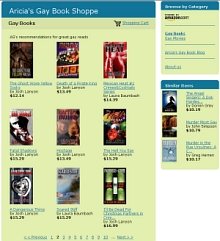Anything Goes -- with John Barrowman and Torchwood
 Here's everything you ever wanted to know about John Barrowman -- plus a lot you couldn't have imagined, and a few items you probably could have lived happily without knowing, but hey, if you're broad-minded it's all a chuckle.
Here's everything you ever wanted to know about John Barrowman -- plus a lot you couldn't have imagined, and a few items you probably could have lived happily without knowing, but hey, if you're broad-minded it's all a chuckle.
Name me someone, anyone, who doesn't love John Barrowman?! Most people, though, would be tightly focused in on a couple of aspects of JB. It's going to be either Captain Jack Harkness who's their fascination, or it's going to be the very gayness of a very gorgeous actor who's out and always has been, or it could easily be the lure of the world of live theater.
In this book, you get to pick what you want, like you're strolling down the buffet table. I guess I'm one of the lucky ones ... I'm interested in the theater, and I'm interested in JB for his own sake, and I've been watching Doctor Who since about 1966, so anything that has DW or Torchwood in it or on it will send my antennas up faster than Uncle Martin's. (I could tell you coming out stories. What, coming out as gay...? No. Coming out as a Doctor Who fan. It was a harrowing experience, but the fact the place had gone gaga just recently for Captain Jack made it easy. I never came out as a DW fan back in the days of rubbery monsters and $2 spaceships. No guts.)
Anyway -- Anything Goes is basically the story of John Barrowman: The First 40 Years ... without omission, and with boatloads of detail, especially about his early years. Those chapters are endearing and amusing. His family (and his father especially) seem to have been fonder than usual of practical jokes, and JB grew up with an, uh, broad sense of humor that knows no shame. If you're of a delicate nature: be warned!
The Doctor Who and Torchwood years are obviously the last few chapters in a bio that's telling four decades of story. (I've heard a few criticisms of the book for this, but I can't see a good enough reason for being critical on this. Anything... isn't "Behind the Scenes with John on Torchwood." It's the story of the man's whole life, of which Jack Harkness features in the last few years. Be reasonable, guys.)
I hadn't realized that JB only "officially" came out to the world at large about five years ago. He gives the impression of a guy who was never "in," so I never thought to question his "in or out" status. I have to confess, my first experience with JB was in the Chris Eccleston season of DW, and like everyone else I was bowled right over. Anyway, the coming out parts of the book are light and easy ... Anything Goes also isn't any kind of "coming out" story. JB had it easy, it seems. I actually wish he'd written a bit more here, but it's possible there isn't anything else to write! If one's life isn't screwed up and traumatized, you just get on with your future, like the song says -- "Don't worry, be happy!"
Anything Goes is a very happy book. In a couple of places the humor isn't the kind of thing you'd want your dear old mom and aunt to read ... and maybe someone's romantic illusions will get a fracture or two ... but this is also a very male book: it's by a guy, about a guy, and one of the best, most interesting things about it, is that it opens a doorway into the mind and heart of a gay guy who's happy and successful -- and invites you in.
The book has loads of surprises which I'm not even going to get into here. It'd be like giving plot spoilers for a fiction book. Just because Anything Goes is non-fic doesn't mean you want somebody to tell you all the best bits before you read it! And do read it --
You can get it in hardback and paperback ... loads of fun, highly recommended! AG's rating: 5 out of 5 stars.
Here's John Barrowman online: http://www.johnbarrowman.com/, and right now you can get very good deals on Anything Goes at Amazon:
(There's also a bunch of Torchwood goodies which I'm going to be naughty and link you to here, as well. I know I should concentrate on the review in hand but ... what the heck, it's MY blog, and I'm going to bend the rules because ... well, because it's Torchwood. So here goes... I'll link a few, but seriously, link on over to Amazon and drool for a while!)































